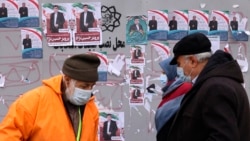The Voice of America’s acting director has denounced Iran for convicting a number of VOA Persian journalists in absentia for the alleged crime of spreading antigovernment propaganda.
The convictions came to light last week, when hacking group Edaalat Ali published Iranian judiciary documents showing that a Tehran Revolutionary Court handed guilty verdicts to dozens of Persian journalists from VOA and other Western news outlets in a secret 2022 trial.
In a Tuesday statement, acting VOA Director John Lippman said “These actions by Iran are typical of a regime that does not value human rights or the rule of law. They are thinly veiled attempts to stop the free flow of information into Iran. They are also evidence of the success of VOA Persian in having an influential role in keeping the issues of women’s rights, open expression, and the importance of a free society front and center in Iran. VOA stands by our journalists and their reporting.”
Iran’s U.N. mission in New York did not respond to a VOA email sent Tuesday requesting comment on Lippman’s statement.
In a Wednesday email to VOA Persian, a State Department spokesperson said it “cannot confirm the veracity of reportedly leaked documents, but the Iranian regime’s intimidation of journalists abroad and repression of the media at home is well-known to the world.”
“A conviction in absentia of journalists based abroad and involved in exposing the regime’s wrongdoing would not be surprising. This is also the latest reminder that Iran’s judicial system is routinely used as a tool of oppression,” the State Department said.
“The United States will continue our active steps, in public and in private, to help journalists around the world continue their work, particularly in the face of such repression,” the spokesperson added.
The leaked Iranian court documents, reviewed and deemed credible by VOA Persian, name 11 VOA Persian journalists and the former VOA Persian service director Setareh Derakhsheh Sieg as having been convicted of propagandizing against the Iranian government. The documents said the named individuals were sentenced to unspecified prison terms and their verdicts were sent to the enforcement branch of the Iranian prosecutor’s office for media and culture affairs.
Lippman said VOA is “reviewing ways to enhance security for both the people who were named and for their families, and we will work with outside agencies and stakeholders to do so.”
The 11 convicted VOA Persian journalists include four women: Hamideh Aramideh, Sara Dehghan, Fahimeh Khezr Heidari and Mahtab Vahidi Rad; and seven men: Mahdi Aghazamani, Niusha Boghrati, Roozbeh Bolhari, Mehdi Fallahati, Arian Risbaf, Arash Sigarchi and Payam Yazdian.
Sigarchi, a Washington-based VOA Persian managing editor, told this week’s edition of VOA’s Flashpoint Iran podcast that he reacted with sadness to learning about the convictions.
“We are not committing any crime here. We try to be good citizens and obey the laws [where we work]. The Iranian authorities try to put a political label on us, but even based on the Islamic republic’s law, our job as journalists is not a crime,” Sigarchi said.
Sigarchi previously served almost three years in an Iranian prison for his work as chief editor of a state-approved Iranian newspaper before he fled the country prior to completing his sentence and moved to the United States. Asked if the latest conviction will affect his VOA Persian work, he said no.
“For me, it is not the first time. We are trying to be fair and balanced as journalists even with this [news]. It will not have any effect on us, because we are just doing our jobs,” Sigarchi said.
More than 30 other Persian diaspora journalists working for Western news outlets were named in the hacked documents as among those convicted of the propaganda offense. They include journalists with VOA’s sister network Radio Farda, BBC Persian, Iran International and Manoto.
A trade union for journalists in Britain and Ireland, the National Union of Journalists, called for international action against Iran in response to the revelations.
In a February 22 statement, the union's secretary-general Michelle Stanistreet said: “Once again, we will be contacting the [British] government and the U.N. and we ask that the wider international community speak out against this outrageous weaponizing of journalists.”
She added: “Particularly worrying is the use by the [Iranian] regime of red notices through Interpol which can inhibit the movement of these journalists, as they travel abroad for work or to meet with family in third countries. We will continue to work with the BBC and International Federation of Journalists to put pressure on [Britain] and other governments to confront Iran about its abuse, including death threats, of journalists.”
VOA’s Persian Service contributed to this report.






